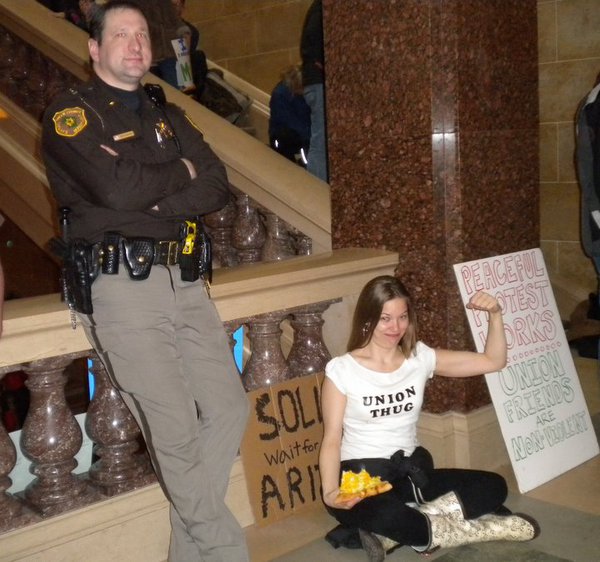Wisconsin Assembly Folds On Union Bill, Senate Dems Still AWOL

Tens of thousands of Wisconsinites and their allies have engaged in a standoff unseen since the Vietnam War era, occupying the state's Capitol for a week and a half.
But the coup de grace was orchestrated by Democrats in the State Senate, who fled Wisconsin rather than give Gov. Scott Walker and his GOP allies the quorum they needed to pass Walker's contested budget legislation.
On Thursday the State Assembly reached an agreement that will bring the bill, which eliminates workers' rights to collective bargaining and increases pay-ins to insurance and pension accounts, up for vote. The Assembly had been debating for more than 48 hours as part of a marathon session, which the Washington Post described this way:
"The scene at the Wisconsin Capitol resembled a siege. Elected officials and their staffers were taking turns sleeping on couches. Some Republican representatives' offices have had to defend themselves from angry protesters who defaced signs supporting Walker. Many Assembly members have had only a few hours of sleep over two nights."
The bill is expected to pass the Assembly and officially head to the Senate.
The trouble for Walker is that he cannot find the "Wisconsin 14," the senators who are believed to be hiding out in Illinois:
"Earlier Thursday, Senate Majority Leader Scott Fitzgerald (R-Juneau) said he dispatched state troopers to round up Senate Democrats because he heard reports some of the legislators were going home nights and driving in the morning to Illinois. Later Thursday, he said no Democrat had been found by the troopers."
Thus, demonstrators in Madison and across the state will be able to continue appealing on the national stage for an intervention of sorts.
Already Indiana, Ohio, Maryland, Virginia and Nevada have joined in the debate, with GOP leadership tending to support union limiting, budget conscious austerity measures and Democrats supporting unions and public programs.
The billionaire conservative Koch Brothers, financial supporters of Walker, have been seen working behind the scenes in several of these states:
"Koch Industries and its subsidiary, the Georgia Pacific Corporation, employ some 3,000 people at firms in Wisconsin that include a toilet paper factory and gasoline supply terminals.
In their way of thinking, this must give the Kochs ample justification for the involvement of their proxies in policy decisions at the state capitol in Madison.
The Koch brothers no doubt see events in Wisconsin as a watershed moment for their libertarian, arch-free market movement against what they consider the excesses of government."
Ohio and Indiana have bills similar to the one in Wisconsin under consideration in their legislatures:
"While Republicans insisted that the bills were required to balance state budgets, Democrats and thousands of protesters who circled and chanted outside the Capitols in Indiana and Wisconsin insisted that the legislation was an all-out attack on the middle class."
Ohian legislators were able to reach a compromise on their bill, but unions would still be prohibited from striking and could bargain only on wages.
Oklahoma and Tennessee are expected to join the fray soon, with union-restricting legislation coming up for debate.



